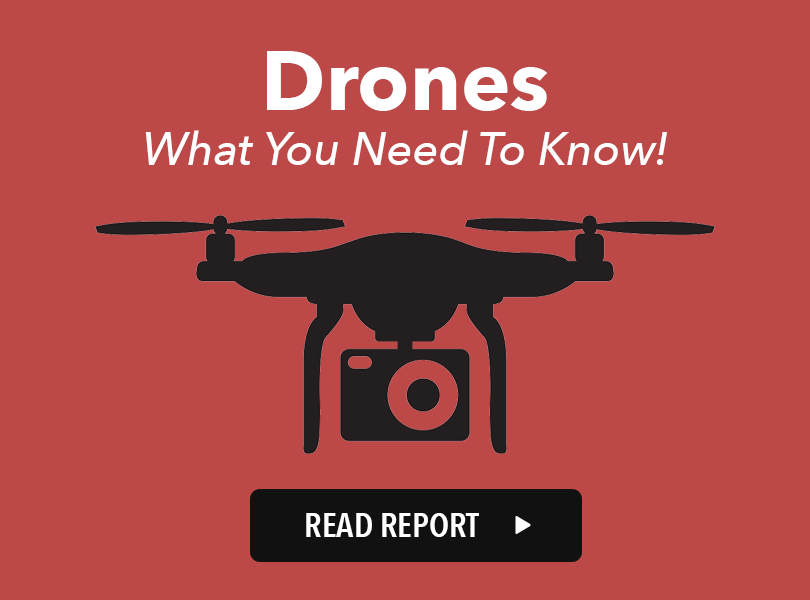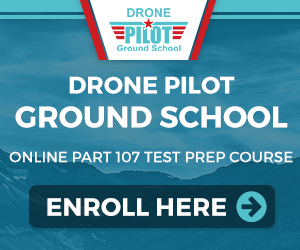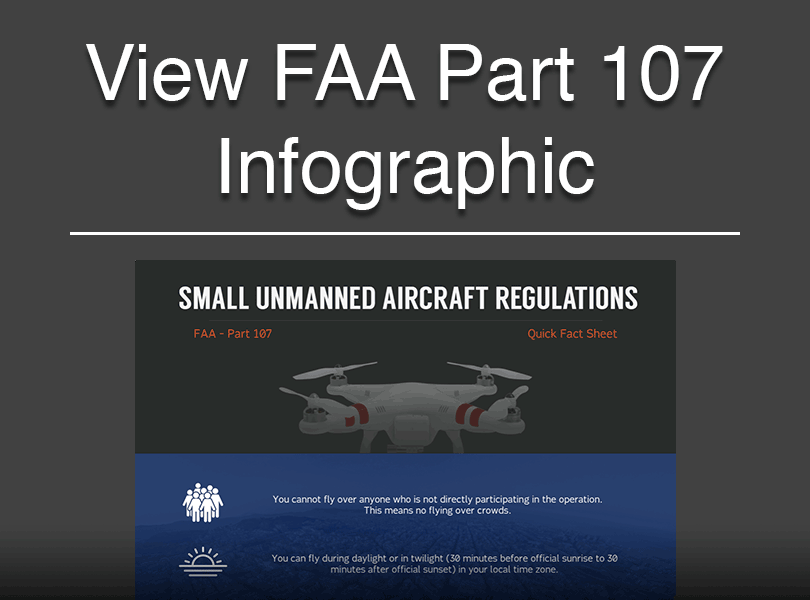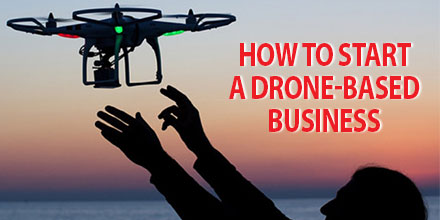 Drone is one of the buzzwords of 2016 as Unmanned Aerial Systems continue to enhance and disrupt various industries.
Drone is one of the buzzwords of 2016 as Unmanned Aerial Systems continue to enhance and disrupt various industries.
The capabilities and benefits of UAV’s has led many to adopt this technology. This technology has also created a myriad of additional commercial opportunities, as well.
Simply creating a successful business enterprise based on drones is not enough. Effective implementation requires careful planning and training.
With this in mind, we’ve created a guide on how to start a drone-based business for beginners.
Preparation and groundwork
If you’re interested in a drone-based business, your project starts with understanding your UAV. Familiarize yourself with your devices’ operational manual before putting it together and flying it.
Understand the FAA’s rules on flying drones and abide by them. The Know Before You Fly educational campaign offers valuable information on air traffic fundamentals and operating procedures. It is a great online resource for novice drone pilots.
Another vital component of preparation is training. Novice drone pilots need to learn how to operate their remotely piloted aircraft skillfully and safely.
Training also helps reduce operational expenses and minimize downtime due to damaged or destroyed equipment. Basics include: take-off and landing, roll, pitch, and yaw, capturing images and video.
The preparation work you do truly is the foundation on which you build your business; the better your preparation, the better your outcome.
Learning the tricks of your trade
Drones are used for a wide range of applications. As such, pilots must practice and become proficient at the piloting challenges their particular application entails.
For those in the aerial photography and cinematography sector, capturing photos and videos from the air may take some time; this is just as true for seasoned photographers.
Capturing images via drone involves different vantage points and a moving camera. And, of course, particular applications require the development of particular skill sets. For example, wedding photos and video require different angles and shots than real estate photography and videography. Applications involving aerial surveillance and mapping utilize different sets of technical aspects altogether.
No matter the business, practice ensures quality work conducted at the highest possible standard.
Permits and getting your drone-based business certified
Preparation and groundwork is invaluable but it amounts to nothing if you cannot fly due to regulatory restrictions.
As a new and growing sector, drone regulations are a work in progress. However, the basic rule of thumb is that commercial drone use is currently prohibited by the FAA. Companies that wish to use drones for commercial purposes must apply to the FAA for a Section 333 Waiver, which are issued on a case by case basis.
Granting of commercial drone use permits by the FAA began in 2014. To date over 1,500 companies have certified their businesses. Today, acquiring a permit for your drone-based business is pretty straight forward. With advice from a lawyer who specializes in drones, your business can get certified and permitted without too much hassle.
Before you apply, familiarize yourself with the FAA’s guidelines on submitting an application for an exemption. Also, review the section 333 guidelines to learn what you’re required to submit to receive authorization.
Once you understand the requirements, you’re ready to file your application on the public docket.
Currently, blanket exemptions are in force which allow commercial operators to fly below 200 feet and use aircraft that weigh less than 55 pounds. Operators must follow restrictions such as keeping a certain distance away from airports and manned aircraft, as well as daytime and visual line of sight rules.
For any requirements that fall outside of the blanket exemptions, commercial drone operators need to wait for their permit before they can begin operations.
Choosing the right drone for your business
Unmanned aerial systems have quickly evolved from a pastime for drone enthusiasts to indispensable tools in a variety of sectors. But each industry requires a drone that meets certain requirements. Drone selection is usually based on the services you'll provide.
While most drones are similar in design and operation, some are packaged for particular applications. Industry specific drones are often equipped with unique payloads and technologies.
The DJI’s Phantom 4 and the Parrot Disco FPV, for example, are popular choices for aerial photography and video. Depending on your budget, the technology and ability of the drone, there is a wide array from which to choose that range in price from $300 up to well over $1000.
Drones designed for surveying and/or mapping purposes come at a higher price tag because of the hardware and software requirements for such applications.
Professional surveying drones can cost up to $10,000 or more, depending on the model. Usually, these systems are packaged with surveying specific technologies such as RGB and NIR cameras, high resolution imaging, longer flight times, autonomous flight, and faster speeds.
For the budget conscious, less expensive drones can capture aerial surveying images and inspection. However, creating a professional business with a quality product does require investment in a more robust system.
Lastly, an investment in a good drone requires further expenditure on accessories and software. Items such as spare batteries to limit down-times, replacement parts in the event of crashes, and software such as photo editing tools and data storage are essential in keeping a drone-based business running smoothly.
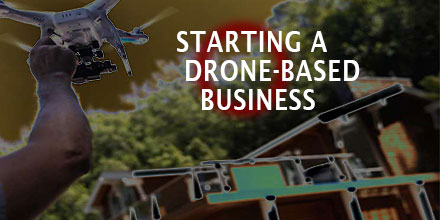 Drones have added a new dimension to a great number of industries and services. Once a pastime for RC enthusiasts, today this technology opens up new opportunities for entrepreneurs looking to start a business.
The real estate industry is one such sector that is taking advantage of the new technology.
It's easy to see how stunning, high definition aerial footage of a listing would benefit a realtor's marketing efforts. In fact, a growing number of realtor's are turning to this technology to gain a competitive edge, especially for their high-end listings. Drone enthusiasts have taken notice.
If you're considering a drone-based business geared towards the real estate industry, there are a number of factors to consider. Read on to learn the 6 top things to consider before you print those business cards.
Drones have added a new dimension to a great number of industries and services. Once a pastime for RC enthusiasts, today this technology opens up new opportunities for entrepreneurs looking to start a business.
The real estate industry is one such sector that is taking advantage of the new technology.
It's easy to see how stunning, high definition aerial footage of a listing would benefit a realtor's marketing efforts. In fact, a growing number of realtor's are turning to this technology to gain a competitive edge, especially for their high-end listings. Drone enthusiasts have taken notice.
If you're considering a drone-based business geared towards the real estate industry, there are a number of factors to consider. Read on to learn the 6 top things to consider before you print those business cards.

 Drone is one of the buzzwords of 2016 as Unmanned Aerial Systems continue to enhance and disrupt various industries.
Drone is one of the buzzwords of 2016 as Unmanned Aerial Systems continue to enhance and disrupt various industries.